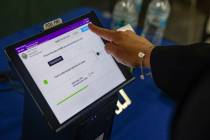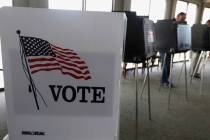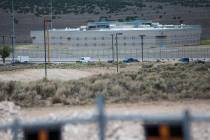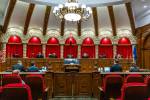Nevada’s economic shortfall growing
CARSON CITY -- State officials will have to make steeper budget cuts or increase taxes far more than anticipated since Nevada's economy will continue to tank heading into 2010, according to tax revenue forecasts made Friday by the Economic Forum.
The shortfall, taking into account newly revised estimates from the panel as well as unanticipated declines in local property tax and sales tax revenue, comes to about $900 million.
"I don't know what we are going to do," said State Budget Director Andrew Clinger, adding Gov. Jim Gibbons will submit a revised budget plan to the Legislature in the near future.
Clinger said Gibbons' plan could include 11 percent salary cuts for state employees, teachers and college and university workers. The governor had proposed 6 percent salary cuts in January.
"It is horrible," added Assembly Majority Leader John Oceguera, D-Las Vegas, about the shape of the state economy. "It is the worst we have ever seen."
Legislators feel the gap could be even higher. Oceguera said the preliminary legislative analysis is the state has $955 million less than earlier projections because of the dismal economy.
An example of how bad things are: The $2.75 billion in general fund tax receipts the state will take in during the fiscal year that ends June 30 are virtually the same as its receipts in the 2004-05 fiscal year.
Oceguera said there will be dramatic cuts in spending before the Legislature adjourns June 1.
He added, however, that tax revenue also must be increased because the Legislature will not support Gibbons' plan to cut spending to the University of Nevada, Las Vegas, and the University of Nevada, Reno, by 50 percent, or permit him to close 11 mental health clinics.
He added legislators cannot back 11 percent salary cuts for employees, since the hit on them would be even greater since Gibbons also wants to cut their health care benefits.
"This is unbelievable," Oceguera said.
On Friday, the Economic Forum revised its Dec. 1 projections of state tax revenue over the next two years downward by $380 million, and by $26 million in the current fiscal year that ends June 30. The state will have to find revenue to make good on current budget expenditures.
The forum is a group of five private business leaders who by law estimate the amount of tax revenue available for state government.
Members also reduced by $72 million what Gibbons believed a 3 percentage point increase in room taxes would bring in when he submitted his budget in January. The room tax was approved in March.
But after the Economic Forum adjourned its day-long meeting, Clinger delivered more distressing, and totally unexpected, news.
On top of the forum's estimates of revenue reductions, he said the Legislature and governor must find another $400 million to cover unanticipated declines in local property tax and sales tax revenue going to the public schools.
He said county property taxes will drop over the next two years, requiring the state by law to make up this share of revenue.
Because the Economic Forum predicts continued declines in sales taxes, and schools directly receive about one-third of all sales taxes, the state must also cover that as well, Clinger said.
The panel estimated that revenues would start to trend upward in fiscal year 2011.
About the only immediate good news Clinger could offer was that he was notified by the U.S. Department of Education earlier Friday that Nevada next week will receive $264 million in federal stimulus funds that could be used for education shortfalls.
He expects another $132 million in September.
Oceguera said legislators believe Nevada ultimately will receive nearly $700 million in federal stimulus funds that can be plugged into the budget.
Still, he said, some tax increases are needed.
Gibbons' communications director Daniel Burns emphasized that Gibbons will veto any proposal coming out of the Legislature that includes tax increases.
"All you have to do is drive down the street and see the shut down businesses and the people looking for money on the corners," Burns said. "You can't raise taxes now. We are trying to stimulate the economy, not kill it."
Contact Review-Journal Capital Bureau Chief Ed Vogel at evogel@reviewjournal.com or 775-687-3901.























